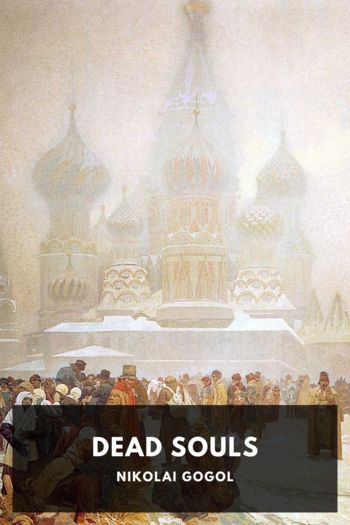Short Fiction - Nikolai Gogol (best selling autobiographies TXT) 📗

- Author: Nikolai Gogol
Book online «Short Fiction - Nikolai Gogol (best selling autobiographies TXT) 📗». Author Nikolai Gogol
When we sat down at the table, a maid fastened a napkin in front of Afanasii Ivanovich; and it was very well that she did so, for otherwise he would have spotted his dressing-gown all over with gravy. I tried to interest him in something, and told him various bits of news. He listened with his usual smile, but his glance was at times quite unintelligent; and thoughts did not wander there, but only disappeared. He frequently raised a spoonful of porridge, and, instead of carrying it to his mouth, carried it to his nose; and, instead of sticking his fork into the chicken, he struck the decanter with it; and then the servant, taking his hand, guided it to the chicken. We sometimes waited several minutes for the next course. Afanasii Ivanovich remarked it himself, and said, “Why are they so long in bringing the food?” But I saw through a crack of the door that the boy who brought the dishes was not thinking of it at all, but was fast asleep, with his head leaning on a stool.
“This is the dish,” said Afanasii Ivanovich, when they brought us mnishki31 with cream—“this is the dish,” he continued, and I observed that his voice began to quiver, and that tears were ready to peep from his leaden eyes; but he collected all his strength, striving to repress them: “This is the dish which the—the—the de—ceas”—and the tears suddenly burst forth: his hand fell upon the plate, the plate was overturned, flew from the table, and was broken; the gravy ran all over him. He sat stupidly holding his spoon, and tears like a never-ceasing fountain flowed, flowed in streams down upon his napkin.
“O God!” I thought, as I looked at him, “five years of all-obliterating time, … an old man, an already apathetic old man, who, in all his life, apparently, was never agitated by any strong spiritual emotion, whose whole life seemed to consist in sitting on a high chair, in eating dried fish and pears, in telling good-natured stories—and yet so long and fervent a grief! Which wields the most powerful sway over us, passion or habit? Or are all our strong impulses, all the whirlwinds of our desire and boiling passions, but the consequence of our fierce young growth, and only for that reason seem deep and annihilating?” However that may be, all our passion, on that occasion, seemed to me child’s play beside this long, slow, almost insensible habit. Several times he tried to pronounce the dead woman’s name; but in the middle of the word his peaceful and ordinary face became convulsively distorted, and a childlike fit of weeping cut me to the heart.
No: these were not the tears of which old people are generally so lavish, when representing to us their wretched condition and unhappiness. Neither were these the tears which they drop over a glass of punch. No: these were tears which flowed without asking a reason, distilled from the bitter pain of a heart already growing cold.
He did not live long after this. I heard of his death recently. It was strange, though, that the circumstances attending his death somewhat resembled those of Pulcheria Ivanovna’s. One day Afanasii Ivanovich decided to take a short stroll in the garden. As he went slowly down the path, with his usual carelessness, a strange thing happened to him. All at once he heard someone behind him say, in a distinct voice, “Afanasii Ivanovich.” He turned round, but there was no one there. He looked on all sides: he peered into the shrubbery—no one anywhere. The day was calm, and the sun shone clear. He pondered for a moment. His face lighted up; and at length he exclaimed, “It is Pulcheria Ivanovna calling me!”
It has doubtless happened to you, at some time or other, to hear a voice calling you by name, which the peasants explain by saying that a man’s spirit is longing for him, and calls him, and that death inevitably follows. I confess that this mysterious call has always been very terrifying to me. I remember to have often heard it in my childhood. Sometimes some one suddenly pronounced my name distinctly behind me. The day, on such occasions, was usually bright and sunny. Not a leaf on a tree moved. The silence was deathlike: even the grasshoppers had ceased to whir. There was not a soul in the garden. But I must confess, that, if the wildest and most stormy night, with the utmost inclemency of the elements, had overtaken me alone in the midst of an impassable forest, I should not have been so much alarmed by it as by this fearful stillness amid a cloudless day. On such occasions, I usually ran in the greatest terror, catching my breath, from the garden, and only regained composure when I encountered some person, the sight of whom dispelled the terrible inward solitude.
He yielded himself up utterly to his moral conviction that Pulcheria Ivanovna was calling him. He yielded with the will of a submissive child, withered away, coughed, melted away like





Comments (0)